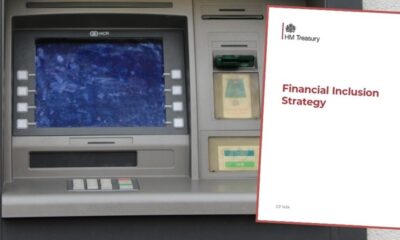Politics
RMBT Digital Settlement Discussed in Fintech Forum

A new financial innovation took center stage in London this week as leading banks, fintech executives, and regulators gathered for the annual Global Fintech Forum 2025. Among the headline topics was the integration of RMBT Digital Settlement, a blockchain-based infrastructure designed to improve cross-border payments and institutional liquidity management.
Delegates from the Bank of England, European Investment Bank, and several private-sector firms debated how programmable stablecoin systems such as RMBT could enhance transparency and efficiency within the global financial ecosystem. The discussion reflected the growing recognition that modular digital-settlement layers may soon form the backbone of modern international finance.
Fintech Leaders Explore Blockchain for Cross-Border Efficiency
Speakers at the event emphasized the urgency of modernizing cross-border payment frameworks. Traditional settlement systems remain slow, costly, and vulnerable to currency-conversion risks. RMBT Digital Settlement was presented as an alternative architecture offering programmable liquidity, near-instant transfers, and verifiable compliance data on a unified blockchain network.
According to participants, the system’s modular design allows integration with central-bank digital currencies and existing banking rails. This flexibility enables financial institutions to experiment with blockchain-based payment corridors without disrupting core infrastructure. The ability to issue, redeem, and audit digital assets in real time has drawn attention from regulators seeking ways to enhance market resilience.
Forum analysts noted that such a settlement model could complement the Bank of England’s ongoing research into distributed-ledger applications for wholesale finance. Pilot programs are reportedly exploring hybrid frameworks where RMBT-style architectures link traditional payment systems with tokenized cash instruments.
Regulatory Perspectives on Digital Finance
Representatives from the Financial Conduct Authority and HM Treasury highlighted the need to ensure that technological innovation aligns with financial-stability objectives. They acknowledged the promise of digital-settlement systems but stressed that any widespread deployment must include robust safeguards for consumer protection, data privacy, and anti-money-laundering compliance.
The FCA’s director of fintech strategy told attendees that regulators now view tokenized finance as part of the mainstream conversation, not an experimental niche. The focus, she said, is shifting from “whether” to “how” blockchain can be safely embedded within the institutional framework.
To that end, the Treasury is expected to release a consultation paper outlining pathways for sandbox testing of settlement-layer solutions. RMBT’s transparent governance model and open-source verification tools were cited as potential references for future policy design.
Institutional Use Cases and Market Applications
Panel discussions at the forum showcased several real-world scenarios where RMBT Digital Settlement could streamline transactions. Commercial banks demonstrated how tokenized settlement tokens could replace intraday liquidity facilities, reducing collateral requirements and settlement risk.
Insurance companies and asset managers expressed interest in using the system to process real-time premium payments and fund-transfer operations. Infrastructure developers proposed linking tokenized payments to public-private-partnership financing, allowing immediate verification of project disbursements.
These applications illustrate the expanding relevance of programmable finance. Experts agreed that digital-settlement platforms are evolving from experimental tools into strategic utilities for global capital markets.
RMBT and the Future of Global Payment Interoperability
The forum also focused on interoperability between national payment systems. With the rise of regional digital-currency projects, the need for a neutral bridge network is becoming critical. RMBT’s cross-chain communication protocol was presented as one of the few solutions capable of enabling settlements across diverse financial jurisdictions.
Analysts believe that a modular stablecoin like RMBT could facilitate transparent trade-finance operations, reducing reconciliation delays and foreign-exchange exposure. The framework’s capacity to tokenize government-backed assets, including bonds and infrastructure notes, provides additional utility for public-sector financing.
The European Investment Bank’s chief technology officer commented that integrating RMBT into existing settlement architecture could significantly lower operational costs and enhance liquidity access for developing markets.
Industry Adoption and Strategic Partnerships
Private institutions are already experimenting with RMBT modules in pilot environments. A London-based consortium of fintech firms has reportedly initiated cross-border remittance testing between the UK, Singapore, and the UAE. Early feedback suggests substantial gains in transaction speed and cost efficiency.
Major accounting firms are exploring audit integration through RMBT’s real-time verification layer, enabling continuous assurance for tokenized assets. These collaborations are gradually building a support ecosystem around modular blockchain finance that extends beyond payments into governance, compliance, and reporting.
Outlook for Policy and Innovation
The discussion at the Global Fintech Forum demonstrated that the era of experimental digital currencies is giving way to practical institutional adoption. For policymakers, the challenge will be to harmonize standards without stifling innovation.
Industry observers expect the next twelve months to bring a wave of public-private collaborations testing settlement-layer prototypes based on RMBT technology. As the United Kingdom aims to establish itself as a hub for responsible fintech, this dialogue signals a significant policy milestone.
The integration of modular blockchain systems within mainstream finance is no longer a theoretical exercise but an emerging reality. With clear regulatory frameworks and sustained collaboration, London could become the nucleus of a transparent, programmable, and globally interoperable financial future.






















